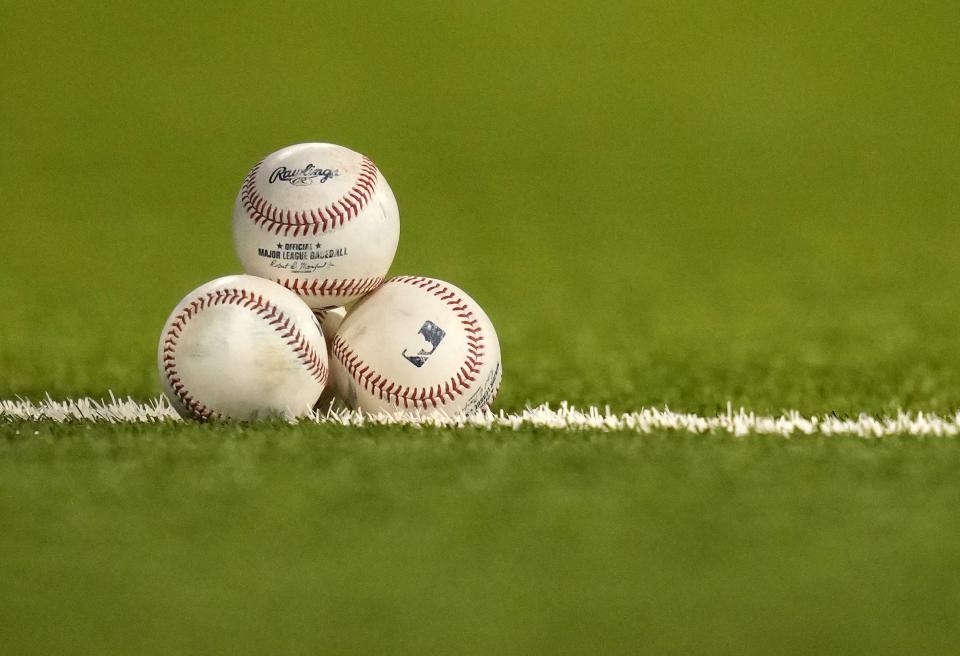MLB lockout: Universal DH approved, Rob Manfred hopeful season won't start late as spring training delay looms
Major League Baseball commissioner Rob Manfred, speaking publicly Thursday for the first time since the Dec. 2 began lockout, remains optimistic the regular season will still start on time, but acknowledges that an agreement likely would need to be reached by the end of February.
Manfred declined to officially postpone the start of spring training, but it’s likely only a formality with camps scheduled to open Feb. 16 and spring-training games beginning Feb. 27. While minor league camps will still open, Manfred said they would not be used as replacement players in spring training games.
MLB and the Major League Baseball Players Association have a scheduled negotiating session Saturday in which Manfred said there will be new and modified proposals designed to make progress towards a new collective bargaining agreement. If the two sides still have a wide gap in their core economic proposals, there likely will be an official announcement on delaying spring training next week.
“You’re always one breakthrough away from making an agreement,’’ Manfred said. “Somebody makes a move. That’s why we will make additional moves on Saturday. …We’re going to make a good-faith positive proposal in an effort to move the process forward.’’
MLB: Lawsuit vs. NFL holds a mirror up to baseball's hiring practices
SPORTS NEWSLETTER: Biggest news, updates straight to your inbox
The biggest concern, however, is not spring training games, but the regular season, which is scheduled to start on March 31.
“I see missing games as a disastrous outcome for this industry,’’ Manfred said. “ And we're committed to making an agreement in an effort to avoid that.’’
Manfred spent most of the 20-minute press conference in Orlando, Fla., defending MLB’s negotiating process and their economic proposals. MLB has officially agreed to a universal DH, Manfred said, along with the elimination of draft-pick compensation for free agents.

Yet, MLB refuses to reduce revenue sharing among clubs, and acknowledged that Manfred misspoke when he said that penalties for exceeding the luxury tax are the same as in the last collective bargaining agreement. The financial penalties are worth nearly twice as much with clubs now losing first-round draft picks for exceeding the highest luxury tax tier.
“In total proposals we've made would move the agreement decidedly in the players’ direction,’’ said Manfred, estimating an increase for a total exceeding $100 million. “Where the clubs have been and remain unwilling to move is in response to player proposals that we believe will undermine the competitive balance in our game.
“For example, the players insistence that we reduce revenue sharing will without question lead to less competition, not more. Changing the current agreement by taking resources from clubs with relatively limited revenue will make the game less competitive. And when you think about it, it's like asking people to take a pay cut.’’
Manfred defended MLB’s stance during the lockout with 43 days elapsing before the two sides convened after Dec. 2. MLB’s last set of proposals was Jan. 25, and instead of offering a counter proposal in their last meeting, MLB offered to have federal mediation.
“We have consistently tried tactics to move the process,’’ Manfred said. “That’s a mutual responsibility of the bargaining parties. The phones work two ways.’’
Meanwhile, with the two sides remaining far apart on the core economic issues, Manfred continues to take a beating with players – and the baseball world as a whole – publicly issuing their disdain towards him.
“Look, I don't play a lot of attention to social media,’’ he said. “I'll be honest with you. I think most of the commentary that's out there is tactical. … Look, it is my part of my job, to get us to an agreement that keeps the game out in the field.
“I take that responsibility really seriously and what somebody says on social media doesn't affect my thinking in that regard. It's my responsibility to do everything we can to make an agreement that the industry can live with and keep the game on the field.’’
Manfred, however, took even more criticism on social media with his response to a question about whether he believed owning a team is lucrative – considering the soaring value price of franchises.
“If you look at the purchase price of franchises, the cash that's put in during the period of ownership and then what they've sold for,’’ Manfred said, “historically, the return on those investments is below what you'd get in the stock market, with a lot more risk.’’
This article originally appeared on USA TODAY: MLB lockout news: Universal DH agreed upon, sides will talk Saturday

